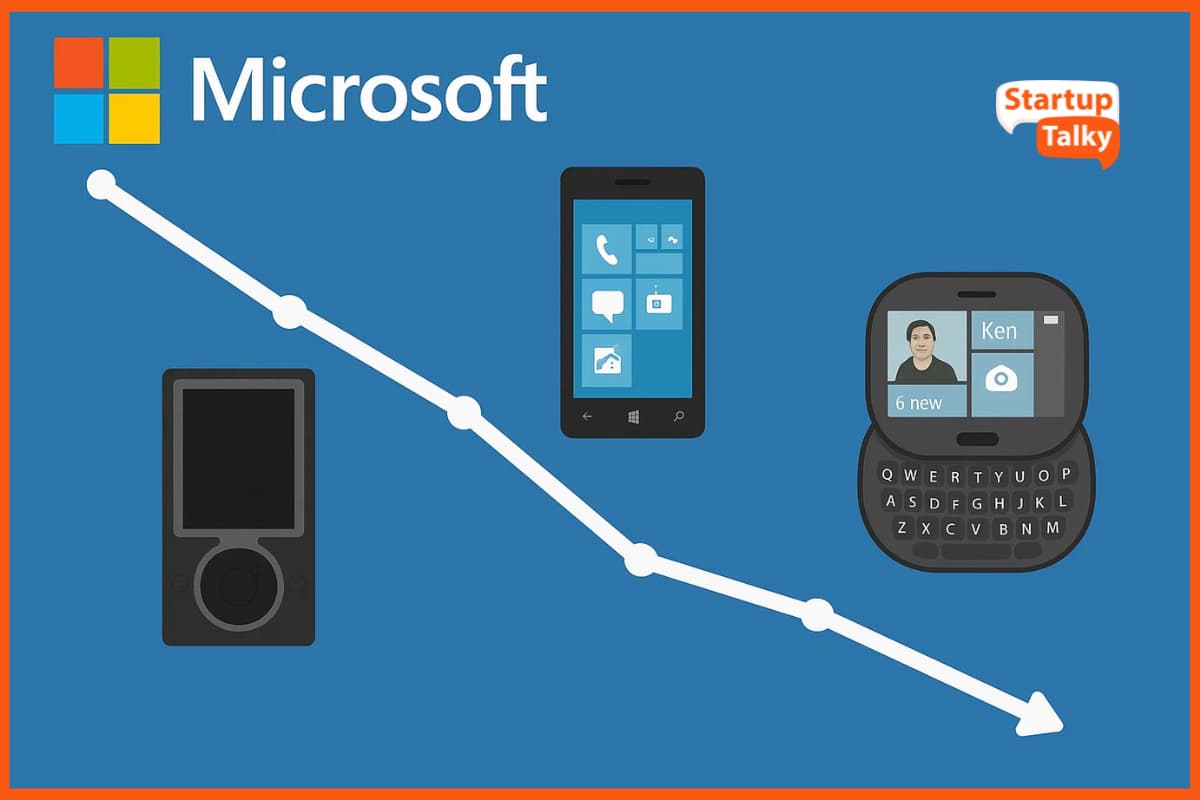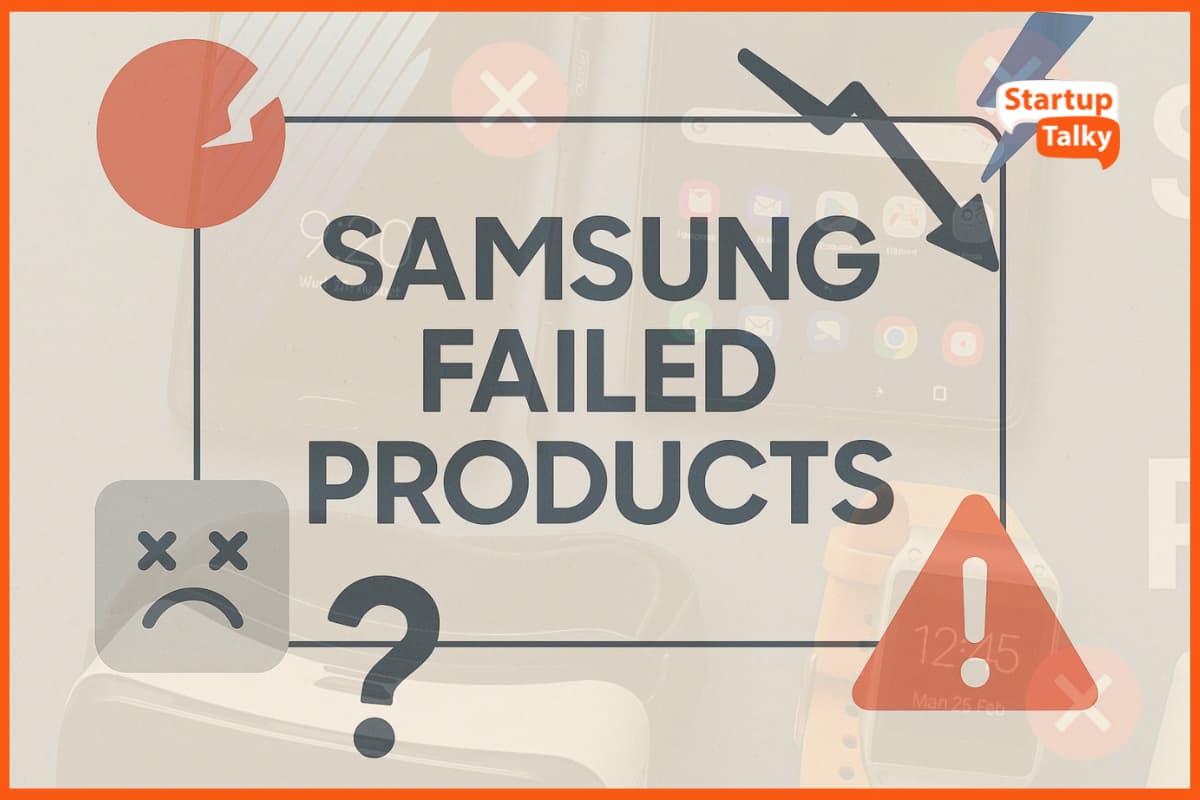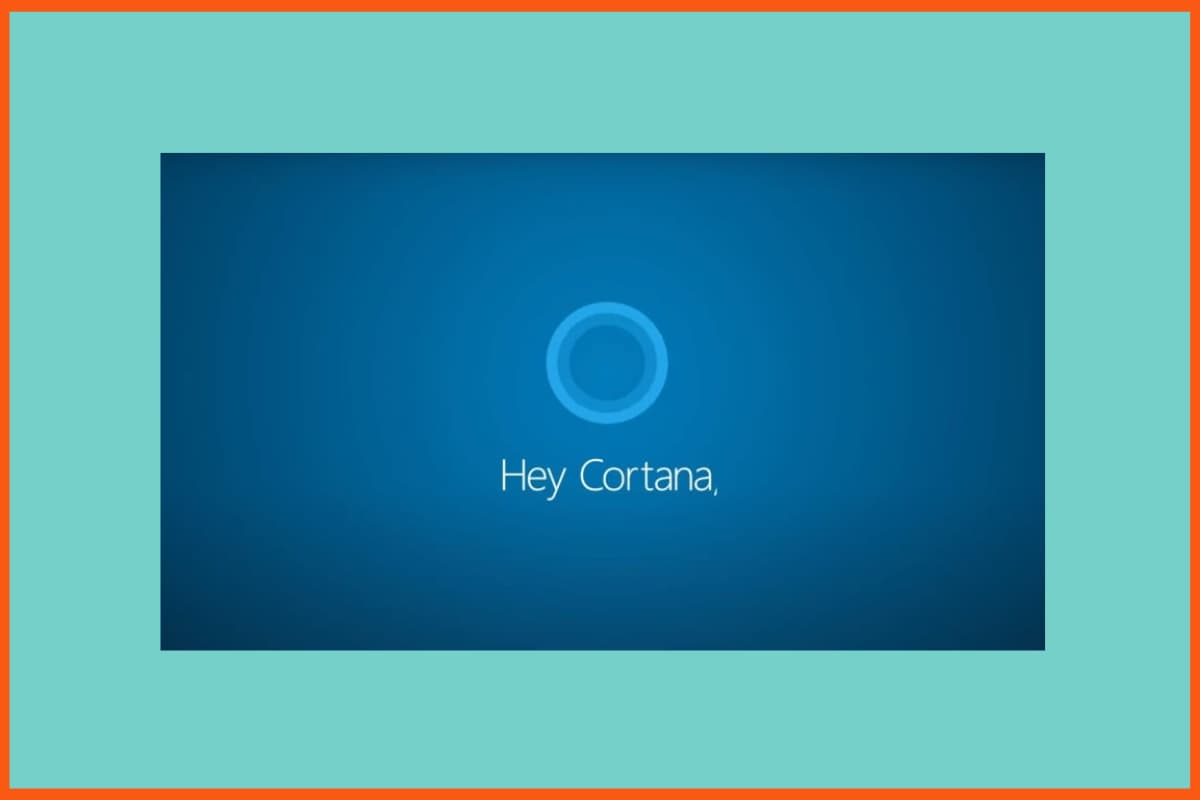Microsoft Failures: List of Failed Products, Projects & Worst Technologies
Collections 🗒️
The American multinational technology giant Microsoft Corp is internationally known for its computer software, personal computers, consumer electronics, and related services. Microsoft was founded by Bill Gates and Paul Allen on April 4, 1975. They rose to popularity during the 1980s by dominating the personal computer operating system market with MS-DOS.
Even today, Microsoft continues to be one of the big five American information technology companies, along with Amazon, Apple, Google, and Meta. While we continue to use a lot of Microsoft’s products and services, little do we know about the failed launches of the firm. This article will focus on the failed products so as to understand the evolution of Microsoft as a company in a more holistic manner, which is not usually done due to the over-emphasis on the products that did well in the market.
| Serial No. | Product | Year Launched | Year Discontinued | Reason for Failure |
|---|---|---|---|---|
| 1 | Zune | 2006 | 2011 | Failed to compete with iPod; poor marketing and limited ecosystem. |
| 2 | Kin | 2010 | 2010 | High price, lack of app support, and unclear target audience. |
| 3 | Windows ME | 2000 | 2001 | Buggy OS, frequent crashes, and poor performance. |
| 4 | Microsoft Bob | 1995 | 1996 | Confusing interface, heavy system requirements, and mocked by users. |
| 5 | Microsoft Portrait | 2001 | Mid-2000s | Ahead of its time; limited hardware support and low adoption. |
| 6 | Microsoft Lumia Smartphones | 2011 (under Nokia) / 2014 (Microsoft) | 2017 | Lack of apps, poor developer support, and dominance of Android/iOS. |
| 7 | MSN | 1995 | Still exists in limited form | Overshadowed by modern services like Google and social media platforms. |
| 8 | MSN TV | 1996 (as WebTV) | 2013 | Obsolete due to smartphones and smart TVs; limited functionality. |
| 9 | Microsoft Surface RT | 2012 | 2013 | Ran on ARM and couldn’t run regular Windows apps; confusing branding. |
| 10 | Windows 8 | 2012 | 2015 (replaced by Windows 10) | Removed Start Menu; confusing for desktop users; bad UI transition. |
| 11 | Windows Vista | 2007 | 2017 | Heavy system requirements, driver issues, and slow performance. |
| 12 | Microsoft Office Assistant (Clippy) | 1997 | 2007 | Annoying and intrusive; disliked by users and became a meme. |
| 13 | Microsoft Internet Explorer 6 | 2001 | 2016 | Security flaws, outdated standards, and poor compatibility. |
| 14 | Microsoft Groove Music | 2012 | 2017 | Low user base; couldn't compete with Spotify and Apple Music. |
| 15 | TerraServer | 1997 | 1999 | Limited consumer use; overshadowed by Google Earth/Maps. |
| 16 | Microsoft Band | 2014 | 2016 | Hardware issues, buggy software, and tough competition from Fitbit & Apple. |
| 17 | Cortana | 2014 | 2023 (mobile & consumer features ended) | Low adoption; lost to Google Assistant, Siri, and Alexa. |
1. Zune

To compete with the Apple iPod, Microsoft launched a new brand of digital media products called Zune. The Microsoft Zune was launched in November 2006, which included portable media players, media player software that was specifically designed for Windows PCs, and a unique music subscription service, which was named Zune Music Pass.
However, the brand did not fare well in the industry, to the extent that it took two years for them to sell 2 million units. It was shut down due to a lack of profitability in June 2012.
2. Kin

While the digital market was going crazy over the release of various kinds of mobile phones, Microsoft, in its attempt to address the contemporary tech trends, launched two mobile phones that were named Kin One and Kin Two.
Despite all the perks that they boasted about the Kin phones, they did not support games and apps that could be downloaded. This was a very bad setback in contrast to the iPhones that were having a breakthrough in the history of mobile phones through the introduction of their App Store in 2008. Unsurprisingly, Microsoft had to stop selling its Kin due to very poor sales, which are rumoured to be less than 10,000 units.

3. Windows ME

It was released as a special millennium edition operating system after Windows 98 in September 2000. Windows Millennium is deemed to be one of the worst OS that Microsoft ever launched. It had severe crashing issues and faced incompatibility with various popular applications that functioned well on Windows 98. Microsoft had to roll back the OS within one year of its release.
4. Microsoft Bob

It was launched in 1995 as a graphical user interface that was meant for Windows 3.1 and Windows 95. The intention was to provide a more nuanced user interface for the users. However, the product did not run well in the market. They were largely criticised for the price, and Microsoft had to roll it back by 1996.
5. Microsoft Portrait

Microsoft Portrait was a video conferencing platform developed by Microsoft during the 1990s. Low internet consumption was the USP of this platform that came way before Skype and FaceTime. However, the product was called back and considered one of the worst Microsoft products. It is an irony to note that the once-flop idea is a billion-dollar industry now.
6. Microsoft Lumia Smartphones

Microsoft acquired Nokia for $7 billion in 2014, which gave them ownership of the Lumia smartphones. It was speculated that the Lumia line of smartphones would be a flagship phone that would run on Windows software. However, they soon became unpopular due to their bad features and lack of competitiveness with respect to the rival phones. By 2017, their quarterly revenue dropped to $5 million.
7. MSN

MSN was launched in 1999 to be a significant competitor in the instant messaging software market. It had more than 330 million active users every month during its zenith. However, Microsoft had to discontinue MSN due to the dispute between the TOM company that maintained MSN from China and Skype. The product was discontinued in 2014.

8. MSN TV

MSN TV was launched by Microsoft after it bought WebTV Networks in 1995. It used a television for display and was supported by online services. It was a perfect alternative for people who were looking for a computer with internet access. However, they had to discontinue this product over controversies and inconsistencies by 2013.

9. Microsoft Surface RT

Microsoft entered into tablet business in the year 2012, and that was when it launched Surface RT and Surface Pro into the market. Although the Surface Pro was a successful product, Surface RT did not fare well. It was basically because of the fact that apps had to be written specifically for Surface RT to be more consumer-friendly. This confused consumers and dismayed app creators. Microsoft bailed on Surface RT in 2013, which led to the biggest sell-off of Microsoft's shares after 200,9, which wiped out over $34 billion in market value.
10. Windows 8

Windows 8, which was released in 2012, was an attempt by Microsoft to gain stronger market dominance in the field of personal computers as they were growing more insignificant with the popularity of tablets and smartphones.
Amongst other features, one of the most highlighted features was its new interface that featured touch-friendly tiles. However, the users and critics did not receive it well. They removed the start menu, which was introduced with Windows 95 and received widespread criticism for it.
Some of the critics even called this operating system a "Colossal blunder”. People found it difficult to work with this OS, especially while not using the touchscreen facilities. Satya Nadella, the CEO of Microsoft at that time, even admitted that there were things that went wrong in the OS. Through the introduction of Windows 10 and the start menu with it, Microsoft tried to mitigate the harm done to its reputation that Windows 8 caused.
11. Windows Vista

After launching Microsoft's popular operating system Windows XP, they launched Windows Vista in November 2006. However, it became another flop just like Windows ME. It had lots of glitches and was slow. Apart from that, its hardware and software had incompatibility issues, which were in addition to high prices. The security issues and other incapabilities further eroded its reputation, which made this OS end up like another black spot in the history of Microsoft.
12. Microsoft Office Assistant (Clippy)

Long before the launch of the Amazon Assistant named Alexa, Microsoft launched its office assistant named Clippy in the year 1997 as an added service to the updated version of Office 97 till 2003.
Apart from the newly born technology, it failed to gain recognition from users, and in the end, Microsoft had to end it with the launch of Office XP. With the introduction of new technology, we can assume it to be favoured by some; however, it is considered a failed product on a larger scale.
Clippy was developed as an office assistant; however, there was no user data collection done by Clippy. Due to this, Clippy failed to gain the trust of people and their acknowledgment. There was a great gap in user interaction with Clippy due to a lack of knowledge of Artificial Intelligence.
13. Microsoft Internet Explorer 6

Undoubtedly, the term "Internet Explorer 6" is an acknowledged term. However, when the talk is about loyal users, Internet Explorer 6 has earned. The answer can be avoided because of its failure. Internet Explorer 6 was introduced in the year 2001 along with the launch of Windows XP.
It was launched to provide a safe and free experience of web surfing. However, it failed to gain users and was replaced with newly launched services termed Microsoft Internet Explorer 7.
Microsoft failed to follow the guidelines provided by the World Wide Web Consortium, causing different visualizations of web pages on Internet Explorer than in their original form. They also failed to focus and improve the services given by Internet Explorer, hence losing the trust of users. The security provided by Internet Explorer was also not up to mark. and is considered one of Microsoft notable failures.
14. Microsoft Groove Music

Just like the popular music platforms available now, such as Spotify and Amazon Music Unlimited, Microsoft had also launched its in-house music platform, Groove Music, launched in 2012 and was discontinued in the year 2017. Grove Music was earlier made as an additional service given to monthly music pass holders of Zune.
After the fall of Zune, Groove was tagged as Xbox Music and given as an additional service to Xbox users. In 2015, Groove Music was renamed to its original tag and was provided as an unlimited music streaming platform at its original price. Groove Music was one of the complete platforms due to its services and compatibility with different devices.
The moves taken by Microsoft were quite lagging as the competition in the same field was too stiff to catch up. Even though Groove was a complete service, there was nothing eye-catching about it to attract users to it.
15. TerraServer

Google Maps is the source of finding unknown locations easily. Long before Google even gave rise to its idea, Microsoft launched a satellite-provided image of Earth. TerraServer was launched in 1997 and discontinued in 1999.
At that time, TerraServer was the first program capable of showing neighbourhood houses with detailed information. It was the first of the best technologies invented by Microsoft. TerraServer did manage to catch the attention of the audience, but failed to survive the interest.
Most of the feedback received by TerraServer was from local users commenting on the images of their houses and neighbourhood. They failed to provide the aim behind creating such a great innovation, as was later done by Google Maps.
16. Microsoft Band

Recently, there has been a growing trend of smartwatches seen by people of all ages. Years back in the trend, Microsoft launched its wearable band consisting of multiple inbuilt Technologies such as fitness tracker features, health-oriented capabilities, compatibility with different devices, etc. The band was launched in 2014 and discontinued in 2016. With the closure of the band, Microsoft gave refunds to its lifelong customers.
Even though the band was launched with the best technology, it was not able to survive in the market. Some reports suggest that the belt attached to the watch was weak and needed to be replaced after some time by Microsoft. The band was almost the best in the technical aspect; however, the band design was not appealing enough to attract users towards it.
17. Cortana

Cortana was Microsoft’s voice assistant, named after the AI character from the Halo video game. It was first made for Windows Phone and later added to Windows 10, Xbox, Skype, Teams, and even iPhones and Alexa.
Microsoft used the same voice actress from the Halo games to make Cortana sound real. But even with a cool voice, most people didn’t use it. It never made it to smart speakers and wasn’t as helpful as Alexa or Google Assistant.
In 2019, Satya Nadella said Cortana was just a helper for Microsoft, not a competitor. Over time, Microsoft removed Cortana from all devices. By 2024, it was completely gone, replaced by Microsoft Copilot.

Conclusion
All these Microsoft fails can never be considered a setback for Microsoft. It was all a learning experience that has only led the company to design and launch better products. Beginning as a lone company in the personal computer market and continuing to be one of the major players in the market even after competition and options soared tells a lot about the commendable way in which Microsoft learns from its mistakes and evolves.
FAQs
What is Microsoft's biggest failure?
Microsoft Lumia, Zune, Kin, MSN, Microsoft Band, Groove Music, and Microsoft Bob are some of the biggest failures of Micorosft.
What is Microsoft's most popular product?
The Windows operating system is the most popular product of Microsoft.
What are Microsoft failed projects?
Microsoft has launched many products over the years, but not all were successful. The Zune failed to beat the iPod, while Kin phones lasted just weeks due to poor features. Windows Phone struggled without enough apps and was shut down in 2017. Operating systems like Windows Vista and Windows 8 were disliked for being buggy or confusing. Projects like Microsoft Bob, Cortana, and Groove Music also failed to win users. Devices like the Microsoft Band and services like MSN TV were either ahead of their time or quickly became outdated.
What is Microsoft overhaul top after series failures?
After many failures, Microsoft changed its focus under CEO Satya Nadella. It moved from failed products to cloud (Azure), AI (Copilot), and useful tools like Teams. This shift helped Microsoft grow strong again and become one of the top tech companies.
Must have tools for startups - Recommended by StartupTalky
- Convert Visitors into Leads- SeizeLead
- Website Builder SquareSpace
- Run your business Smoothly Systeme.io
- Stock Images Shutterstock








